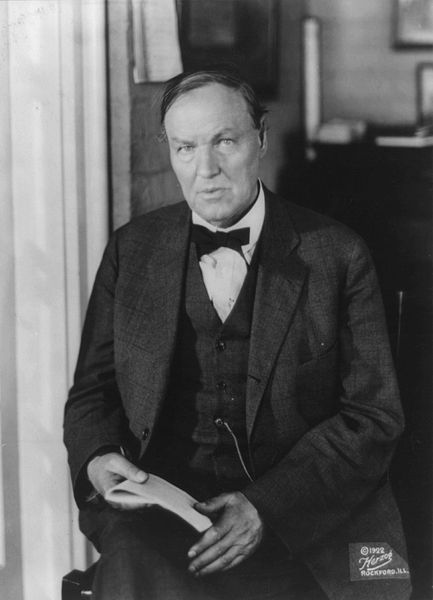Clarence Darrow (Clarence Darrow)

Attorney and Social Activist. Clarence Darrow was the son of former Unitarian minister Amirus Darrow, a freethinking iconoclast who sheltered escaping slaves in the Darrows’ Kinsman, Ohio home. Atrracted to debate by his father’s continual need to defend his political and religious positions, Darrow trained for one year as an undergraduate at Allegheny College and for another year at the University of Michigan Law School before passing the Ohio bar in 1878 and beginning his practice in Youngstown. Darrow moved to Chicago in 1887 to become a corporate attorney for Chicago and Northwestern Railway, but left that position in 1894 to defend his employer’s opponent Eugene V. Debs, the leader of the American Railway Union in the Pullman Strike of 1894. From that point on, Darrow would become known as a premier defense attorney who specialized in representing those from the American underclass. Among his better known cases were his successful defense of International Workers of the World leader Bill Haywood in that radical labor leader’s trial for the 1905 assassination of Idaho governor Frank Steunenberg, his 1911 successful plea bargain on behalf of the MacNamara brothers after the militant trade unionists had bombed the “Los Angeles Times” offices, and his 1925 work on behalf of Ossian and Henry Sweet (along with nine other African-American defendants) in a series of trials that ended up with all eleven accused being cleared – a historic precedent in trials involving black people charged with crimes against whites. Darrow’s two best known cases were the Leopold and Loeb murder case in 1924 and the Scopes “Monkey Trial” in 1925. In the Leopold and Loeb case, the accused teenagers, both University of Chicago students with IQs in the high genius range, had murdered 14-year-old Bobby Franks as an experiment in Nietzschean ethics. Faced with a mountain of physical evidence and very unsympathetic defendants, Darrow opted to advise his clients to plead guilty, then delievered an amazing 12-hour closing argument that invoked the forces of modern ideas on the crime and a Freudian understanding of the defendants’ motivations; Leopold and Loeb were both spared the death penalty. In the Scopes trial, Darrow defended John T. Scopes, a Tennesse football coach accused of violating that state’s Butler act by teaching evolution while filling in for an absent Biology teacher. Though Scopes was found guilty, Darrow made his case for scientific freethought by calling the prosecuting attorney, statesman and religious activist William Jennings Bryan, as a witness on the inerrancy of the Bible and, in the opinion of most observers, proving Bryan’s position specious; Scopes guilty verdict was later overturned on a technicality. Darrow largely retired after the Scopes trial, though he did accept a large fee (after taking large stock losses in the Great Depression) to defend the wealthy Thalia Massey in a racially charged 1934 manslaughter trial in the then-territory of Hawaii. Following his death, Darrow was portrayed by Spencer Tracy in the 1960 film “Inherit the Wind” (based on the Scopes trial) and by Henry Fonda in a 1974 one-man show recapping the great advocate’s life. (bio by: Stuthehistoryguy) Family links: Parents: Amirus Darrow (1817 – 1904) Emily Eddy Darrow (1823 – 1872) Spouses: Ruby Hamerstrom Darrow (1878 – 1957) Jessie Evelyn Ohl Brownlee (1857 – 1953)* Siblings: Channing Ellery Darrow (1850 – 1911)* Clarence Darrow (1857 – 1938) Huber H Darrow (1860 – 1905)* Herman Cortez Darrow (1865 – 1933)* *Calculated relationship
Born
- April, 18, 1857
- USA
Died
- March, 03, 1938
- USA
Other
- Cremated

